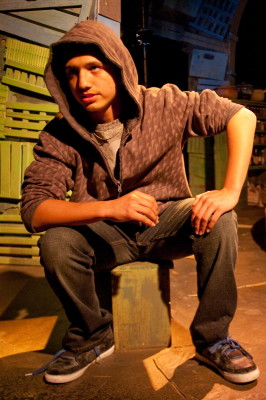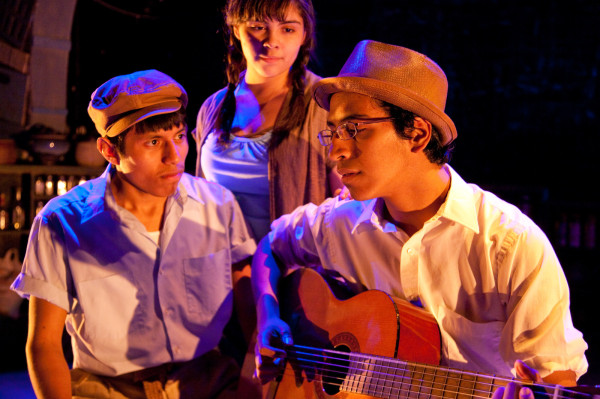
Feast (2010)
At the end of “Feast,” the remarkable production by the Albany Park Theatre Project showcased Tuesday night at the Goodman Theatre, the members of the 21-strong, multi-ethnic teenage ensemble introduced themselves individually. “And we,” someone says at the end, “are APTP.”
If you know people who doubt the vital importance of arts in the schools— or, as in this case, the arts in the lives of teenagers — you should drag them by the wrist to Albany Park this fall, make them watch that moment, make them stare at the glowing faces of these thrilled kids, and ask them to defend their point of view.
The benefits are so obvious — self esteem, tolerance, articulation skills, awareness of difference, pride in personal history, collaborative skills for the future. The kids in this show have roots in Puerto Rico, the rural Philippines, India, Mexico. They loved telling their stories, clearly. But I don’t anything quite matched that final moment when they said who they were. I wish I belonged to something like that myself.
"I wish I belonged to something like [APTP] myself."
Chicago Tribune
I’m late to the banquet at the Albany Park Theatre Project, although I did see a little of this remarkable operation’s work many years ago. I don’t like reviewing youth- or community-based theater that aims to be as much (or more) for the participants as it is for the audience. Kids don’t need to be dealing with critics, since honest critics have to catalog failures and failure comes fast enough in life without reading about yours in a newspaper when you are 13. Sure, a review can go easy. But kids know condescension, and know when they are being treated with kid gloves. They want and deserve honesty. Better to give them a safe space to express themselves.
But Albany Park Theater Project has some rabid fans who sense that it changes lives. I’ve been stopped on the street and in theater lobbies and told what I was missing, several times. A couple of its devotees live on my block. Quite a few more work at my newspaper. But I’ve resisted, citing policy. But then “Feast” was showcased at the Goodman Theatre’s Latino Festival, fast on the heels of those remarkable Cuban actors. And so I went. And here we are.
“Feast” is certainly one of the best shows you’ll ever see of its kind. Here’s why: the product is not compromised by the process. Most of us have been conditioned to expect that shows dealing with teenagers and social causes are worthy enterprises, but not necessarily for those of us who don’t have a family member involved. “Feast” is not like that at all. It stands on its own, no allowances required.
"Feast" understands that the seductive, steamy smell of grilled beef and crisp hot fries in a closed paper bag, lodged between the seats of a car — also has its sensual place in the food culture of an immigrant neighborhood. A slider with your dad can be a great culinary moment.
That’s partly because director David Feiner knows how to fuse movement, story and self-expression with sophisticated artistry that shapes, hones, empowers. He doesn’t push his cast toward romanticism. He protects their dignity and truth. Sure, “Feast” celebrates a family who make tamales as if their own child will eat every one. But it also understands that White Castle — the seductive, steamy smell of grilled beef and crisp hot fries in a closed paper bag, lodged between the seats of a car — also has its sensual place in the food culture of an immigrant neighborhood.
Feiner doesn’t judge. A slider with your dad can be a great culinary moment.
Another piece deals with the difference between buying generics at Aldi and brand names at Jewel. They are all the same goods, you think. And you’d mostly be right. But you’re also taught by this storyteller that if your mom always shops generic, those brand names beckon.
That is the timeless immigrant dream, of course. It is easily exploited. But the kids that are APTP are being taught to know that. They are being taught so many things, and they’re teaching it right back. Take your kids to see them.
 Menu
Menu
